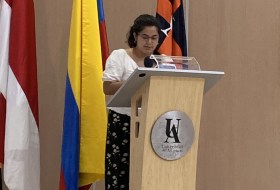News
Unicauca Students Present Their Research Project on Social Justice and Ethnic Perspectives
At the 19th National Congress on Legal Philosophy and Social Philosophy, students María Daniela Guacán Joya and Gloria Fabiana Andrade Montenegro, members of the research group on Ethics, Political, and Legal Philosophy, along with the group's director Aristides Obando Cabezas, shared their research titled 'Challenges of Social Justice in Colombia: Perspectives from Ethnic Communities' with the academic community of the Universidad del Atlántico.”
Students from the Law program at the Universidad del Cauca, María Daniela Guacán Joya and Gloria Fabiana Andrade Montenegro, along with Professor Aristides Obando Cabezas, presented some conclusions from their research project 'Challenges of Social Justice in Colombia: Perspectives from Ethnic Communities' during the 19th National Congress on Legal Philosophy and Social Philosophy at the Universidad del Atlántico. The event, which took place from May 22 to 24 in Barranquilla, focused on the theme 'Democracy, Memory, and Territory' and included as one of its objectives a tribute to Dr. Rafael Osorio Peña.
The students from the research group on Ethics, Political, and Legal Philosophy, along with the director of the group, presented their papers as part of each specific component of the research project as follows:

Provided photo
The paper 'Social Justice through the Lens of Ethnic Communities: A Conceptual Framework,' presented by Gloria Fabiana Andrade Montenegro, covered the conceptual framework of the research project. It outlined the theoretical foundations, key concepts, and essential definitions that support the project led by the research group on Ethics, Political, and Legal Philosophy.
Meanwhile, María Daniela Guacán Joya presented the paper titled 'Legal Translation and Interculturality: Advances and Challenges in Social Justice for Indigenous Communities in Colombia,' which reviews the project's State of the Art, focusing on current issues of Social Justice in indigenous communities. It analyzes the contemporary contexts of these communities, current projects being developed within the framework of customary justice and the revitalization of indigenous languages, as well as the translation of legal documents into indigenous languages by ordinary justice.

Provided photo
Additionally, Professor Aristides Obando Cabezas, with his paper 'Justice as Recognition,' presents a derivative of the research project, supported by the Ibero-American Association of Practical Philosophy. This paper addresses the theme of justice as recognition and raises current issues related to justice.
For more information:
Faculty of Law, Political Science, and Social Sciences
Email: derecho@unicauca.edu.co


